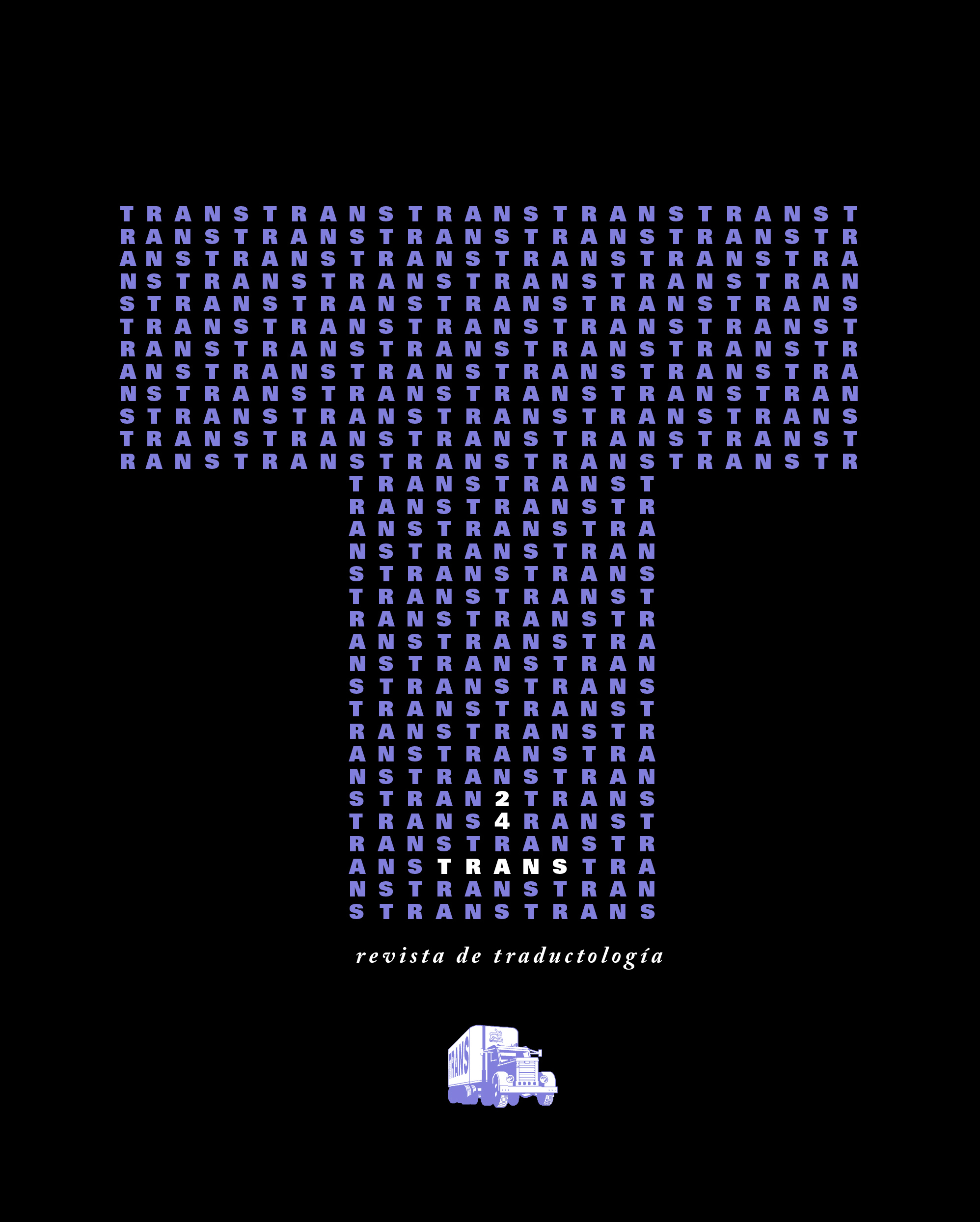The Editorial Production of Translated Comics in the Spain of the Crisis (2009-2015)
DOI:
https://doi.org/10.24310/TRANS.2020.v0i24.9402Keywords:
translation, publishing industry, comic, graphic novel, economic crisisAbstract
This article is aimed at presenting a careful review of translated comics in Spain during the most severe years of the economic crisis (2009-2015). Its purpose is obtaining as precise figures as possible on the volume of production of this genre and unveiling the trends on the editorial processes from a translation perspective. Special attention is given to the impact of the original languages of the texts under the umbrella of the editorial mechanisms in recent years in Spain.
Downloads
Metrics
Publication Facts
Reviewer profiles N/A
Author statements
Indexed in
-
—
- Academic society
- N/A
- Publisher
- Universidad de Málaga
References
Altarriba, A. (2011): «Introducción sobre el origen, evolución, límites y otros debates teóricos en torno a la historieta», Arbor, 187, <http://arbor.revistas.csic.es/index.php/arbor/article/view/1369/1378> [consulta: 14-VIII-2020]
Altenberg, T. y R. J. Owen (2015): «Comic and Translation», en T. Altenberg (ed.), New Readings, vol. 15, ISSN: 13597485, <http://ojs.cf.ac.uk/index.php/newreadings/issue/view/18/showToc> [consulta: 16-V.2020].
Bardin, L. (1986): El análisis de contenido, Madrid: Akal.
Barrero, M. (2005): «La novela gráfica. Perversión genérica de una etiqueta editorial», Literaturas, 10, <http://literaturas.com/v010/sec0712/suplemento/Articulo8diciembre.html> [consulta: 22-V-2020]
Barrero, M. (2015): Diccionario terminológico de la historieta, Sevilla: ACyT Ediciones.
Borodo, M. (2015): «Multimodality, translation and comics», Perspectives: Studies in Translatology, vol. 23, Nº 1, 22-41. DOI: <http://dx.doi.org/10.1080/0907676X.2013.876057> [consulta: 16-V-2020]
Celotti, N. (2008): «The Translator of Comics as a Semiotic Investigator», en F. Zanettin (ed.), Comics in Translation, Manchester: St Jerome Publishing, 33-49.
Constenla, T. (2013): «Cómic-protesta oriental», El País, 9 de julio, <http://elpais.com/articulo/sociedad/Expedientada/clinica/curar/homosexualidad/elpepisoc/20100615elpepisoc_8/Tes> [consulta: 19-IV-2020]
Deppey, D. (2006): «The Eddie Campbell Interview», The Comics Journal, 273, 66-114.
Martín, P. (2013): «Cómic y novela gráfica, de la nada al “boom” en cinco años», El País digital, 8 de junio, <http://economia.elpais.com/economia/2013/06/08/agencias/1370694496_344976.html> [fecha de consulta: 18-V-2020]
Eisner, W. (2006): Eisner/Miller: Entrevista modernada por Charles Brownstein, trad. Raúl Sastre, Barcelona: Norma Editorial.
Fouces González, C. G. (2011): «Mapas de traducción en Europa. La ficción narrativa comercial en Italia y España», TRANS, 15, 117-130.
García, S. (2010): La novela gráfica, Bilbao: Astiberri.
García, S. (2015): Cómics sensacionales, Barcelona: Larousse.
Gómez Salamanca, D. y J. Rom Rodríguez (2012): «La novel·la gràfica: un canvi d’horitzó en la indústria del còmic», Ítaca. Revista de Filologia, 3, ISSN 2172-5500, 35-65.
Kaindl, K. (1999): «Thump. Whizz, Poom: A Framework for the Study of Comics under Translation», Target, 11:2, Amsterdam: John Benjamins, 263-288.
Landry, R. (1998): «L´analyse de contenu», en B. Gauthier (ed.), Recherche sociale. De la problemátique à la collecte des données, Sillery: Presses de l’Université du Québec, 329-356.
Las Cuatro De Syldavia (2015): «Ceci n’est pas un tebeo», Vasos Comunicantes, 46, 55-73.
Mayer, R. y F. Ouellet (1991): Méthodologie de recherche pour les intervenants sociaux, Boucherville: Gaëtan Morin Éditeur.
McCloud, S. (2001): La revolución de los cómics, trad. Estudio Fénix, Barcelona: Norma Editorial.
Ministerio de Educación, Cultura y Deporte (2013): El sector del libro en España 2011-2013, Madrid: Ministerio de Educación, Ciencia y Deporte, <http://mcu.es/libro/docs/MC/Observatorio/pdf/Sector_Libro_2011_13_sept13.pdf> [consulta: 20-V-2020]
Ministerio de Educación, Cultura y Deporte (2016): Panorámica de la edición española de libros 2015. Análisis sectorial del libro, Madrid: Ministerio de Educación, Ciencia y Deporte, <http://sede.educacion.gob.es/publiventa/panoramica-de-la-edicion-espanola-de-libros-
-analisis-sectorial-del-libro/libros-y-lectura/20784C> [consulta: 27-V-2020]
Schwartz, B. (2010): «Introduction», en B. Schwartz (ed.), Best American Comics Criticism, Seattle: Fantagraphic Books.
Tanzi, V. (2010): La crisis financiera y económica de 2008-2009: efectos fiscales y monetarios, <https://asip.org.ar/la-crisis-financiera-y-economica-de-2008-2009-efectos-fiscales-y-monetarios/> [consulta: 20-V-2020]
Unesco (2007): Medir los flujos de traducción: ¿con qué finalidad?, <http://portal.unesco.org/culture/en/ev.php-URL_ID=7810&URL_DO=DO_TOPIC&URL_SECTION=201.html> [consulta: 25-V-2020]
Vélez, A. (2006): «El espíritu de Will Esiner», 68 revoluciones, <http://68revoluciones.com/?p=432> [consulta: 13-V-2020]
Zanettin, F. (2008): Comics in translation, Manchester: St. Jerome Publishing.
Downloads
Published
How to Cite
Issue
Section
License
All contents published in TRANS. Revista de Traductología are protected under the Creative Commons Attribution-NonCommercial-ShareAlike 4.0 International (CC BY-NC-SA 4.0) license. All about this license is available in the following link: <http://creativecommons.org/licenses/by-nc-sa/4.0>
Users can copy, use, redistribute, share and exhibit publicly as long as:
- The original source and authorship of the material are cited (Journal, Publisher and URL of the work).
- It is not used for comercial purposes.
- The existence of the license and its especifications are mentioned.
- ShareAlike — If you remix, transform, or build upon the material, you must distribute your contributions under the same license as the original.
There are two sets of authors’ rights: moral and property rights. Moral rights are perpetual prerogatives, unrenounceable, not-transferable, unalienable, imprescriptible and inembargable. According to authors’ rights legislation, TRANS. Revista de Traductología recognizes and respects authors moral rights, as well as the ownership of property rights, which will be transferred to University of Malaga in open access.
The property rights are referred to the benefits that are gained by the use or the dissemination of works. TRANS. Revista de Traductología is published in an open access form and it is exclusively licenced by any means for doing or authorising distribution, dissemination, reproduction, , adaptation, translation or arrangement of works.
Authors are responsable for obtaining the necessary permission to use copyrighted images.













21.png)
